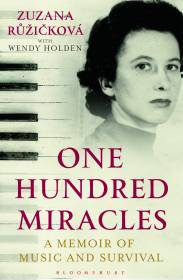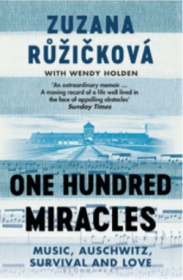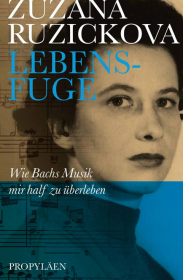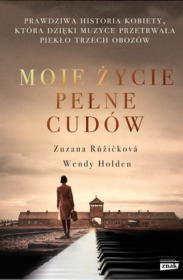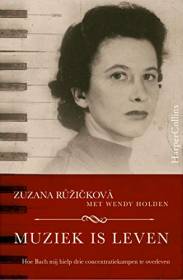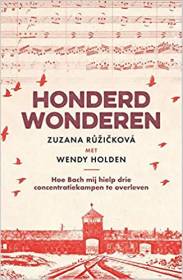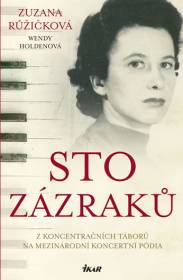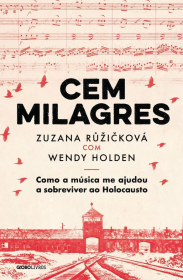One Hundred Miracles: A Memoir of Music and Survival
The remarkable memoir of Zuzana Růžičková, Holocaust survivor and world-famous harpsichordist.
Zuzana Růžičková grew up in 1930s Czechoslovakia dreaming of two things: Johann Sebastian Bach and the piano. But her peaceful, melodic childhood was torn apart when, in 1939, the Nazis invaded. Uprooted from her home, transported from Auschwitz to Hamburg to Bergen-Belsen, bereaved, starved, and afflicted with crippling injuries to her musician's hands, the teenage Zuzana faced a series of devastating losses. Yet with every truck and train ride, a small slip of paper printed with her favourite piece of Bach's music became her talisman.
Armed with this 'proof that beauty still existed', Zuzana's fierce bravery and passion ensured her survival of the greatest human atrocities of all time, and would continue to sustain her through the brutalities of post-war Communist rule. Harnessing her talent and dedication, and fortified by the love of her husband, the Czech composer Viktor Kalabis, Zuzana went on to become one of the twentieth century's most renowned musicians and the first harpsichordist to record the entirety of Bach's keyboard works.
Zuzana's story, told here in her own words before her death in 2017, is a profound and powerful testimony of the horrors of the Holocaust, and a testament in itself to the importance of amplifying the voices of its survivors today. It is also a joyful celebration of art and resistance that defined the life of the 'first lady of the harpsichord'- a woman who spent her life being ceaselessly reborn through her music. Like the music of her beloved Bach, Zuzana's life is the story of the tragic transmuted through art into the state of the sublime.
Michael Beckerman reviews the book for The New York Times – “Bach Was a Musician’s Companion to Tragedy"
A writer once described the composer Leos Janacek’s smile as something that “life awards us like a gold medal for bravery in the face of the enemy.” A similar kind of dignity clung to Ruzickova throughout her life and career, and it fills her memoirs. Especially through World War II, sound was at the core of her resilience.
Nick Rennison reviews the book for The Sunday Times (UK) – “One Hundred Miracles by Zuzana Ruzickova review — a Holocaust survivor’s extraordinary memoir"
“Bach’s music is order in chaos,” the well-known Czech harpsichordist Zuzana Růžičková notes. “It is beauty in ugliness.” As revealed in this extraordinary memoir, assembled after her death in 2017 by Wendy Holden, Růžičková experienced much of life’s chaos and ugliness. “
Carol Lieberman reviews the book for EMA Early Music America – “Book Review: Inspiring Profile In Courage"
Book Review: Inspiring Profile In Courage – “it is must reading for anyone interested in the history of the harpsichord and early music in the 20th century, and as a model of courage, resilience, and dedication…One Hundred Miracles: A Memoir of Music and Survival is told in Zuzana’s own words, with the assistance of journalist Wendy Holden, who interviewed Zuzana just before her death. The book also includes interviews with Zuzana’s friends, fellow performers, and husband Viktor, plus information taken from the 2017 documentary, Zuzana: Music Is Life, directed by Harriet Gordon Getzels and Peter Getzels…Holden has not only shaped a memoir of Zuzana Růžičková and her life as a great performer. She has also chronicled one of the darkest times in European history and demonstrated one person’s ability to overcome them through her dedication to life and music.
Excerpt from the book:
“Viktor helped me so much during the first years of our marriage. He gave me the spiritual strength to keep surviving even through all these new and frightening challenges. He held me when I cried out in my sleep, and he soothed me after every nightmare. I was often crippled by my memories, but Viktor helped me regain my inner balance by constantly reminding me that I had survived and could now devote myself to my music. He also assured me how good I was as a musician and I trusted him because I respected his opinion. With Viktor there were no platitudes and I knew he couldn’t lie about something as important as that. In time I came to realise that I only wanted three things from life – that I was alive and not hungry, that I could make music, and that I had my mother and Viktor.
Most importantly of all, he made me talk and talk about my experiences. He was the first person to make me rest because I was a terrible workaholic, and he would make me stop practicing after three hours and tell me, “You need to clear your head.” We would cycle to the Divoká Šárka nature reserve on the outskirts of the city and walk in the woods. I soon found that the walk did me a lot of good, but when I came home I would practice for three more hours. I am no expert in Jewish culture, but I always liked the concept of the Sabbath Soul – a day of rest when the soul is obliged to celebrate creation. Keeping one day a week free gives you a chance to reflect on life’s lessons and regain focus. And I loved that the tradition is not only for the people but also for the beasts of burden, so that they can rest too.
Viktor continually promised me that we were living in unusual times, and that what happened with the war was rare. He claimed that nothing like the Nazis would ever happen again. I knew he didn’t really believe that and neither did I, but it was good to hear him say it anyway.
The truth was that he was extremely pessimistic about political developments. He knew a lot about what was happening in the Soviet Union. He read all these memoirs of Russian emigrés and he knew that the next developments in Czechoslovakia would not be good. But he tried to hope for the best and he tried to help me lead a normal life again. I discovered in Viktor a person who was gentle and very truthful, and whom I could absolutely rely on. And that was a far better medicine for me than trying to be optimistic about our situation.
Throughout our long and happy marriage, whenever he came home from work, depressed about the latest situation, he would tell me, “I need to clear my head." Without another word, the two of us would sit at the piano and play four hands together night after night. He used to say that he needed to make himself clean. I always played the bass and Viktor the upper voices. He was a better pianist and we played Brahms, Beethoven, everything.
We both adored Stravinsky and I was always happy to play Bach, of course, but we also played a great deal of Haydn and Mahler. Viktor loved Hindemith’s piano sonatas as well as those by Bartók and Honneger. We would play and play until my mother told us that our evening meal was ready.
Dear Viktor always said that next to his music he had one wish for his life – to rid me of the trauma of war, to heal me, and make me feel like a normal person again. He said that the greatest tragedy of those who had suffered my fate was that they somehow felt excluded from the human race. It took his love to cure me and, just like my parents, we two were very much in love – until the end of our days.

WENDY HOLDEN was a respected journalist for eighteen years, ten for the Daily Telegraph, covering news stories and wars around the world, including Northern Ireland, Eastern Europe, and the Middle East.
She is the author of more than thirty non-fiction titles, many of which are international bestsellers and most of which feature strong, inspirational women. They include Born Survivors, the story of three mothers who hid their pregnancies from the Nazis and somehow managed to survive along with their babies; Tomorrow to Be Brave about the only woman in the French Foreign Legion; Behind Enemy Lines featuring a French Jewish spy in WWII; and Till the Sun Grows Cold the story of a British woman caught up in the Sudanese war.
Wendy has ghosted numerous other autobiographies of remarkable women, including Goldie Hawn, Barbara Sinatra, Patricia Gucci and Deana Martin. She has written other books with war heroes, a pioneering female police officer, a brave paraplegic and mother, as well as the memoirs of several public figures.
Her first novel, The Sense of Paper, was published by Random House, New York to critical acclaim. Her second novel, The Cruelty of Beauty, will be published later this year. She lives on a farm in Suffolk, England, with her husband and two dogs and is currently working on a new novel.
